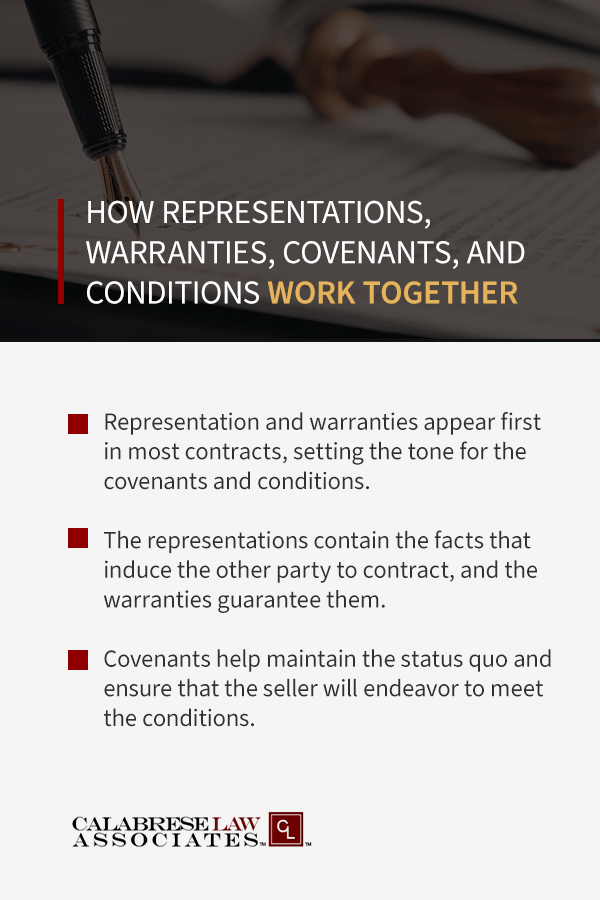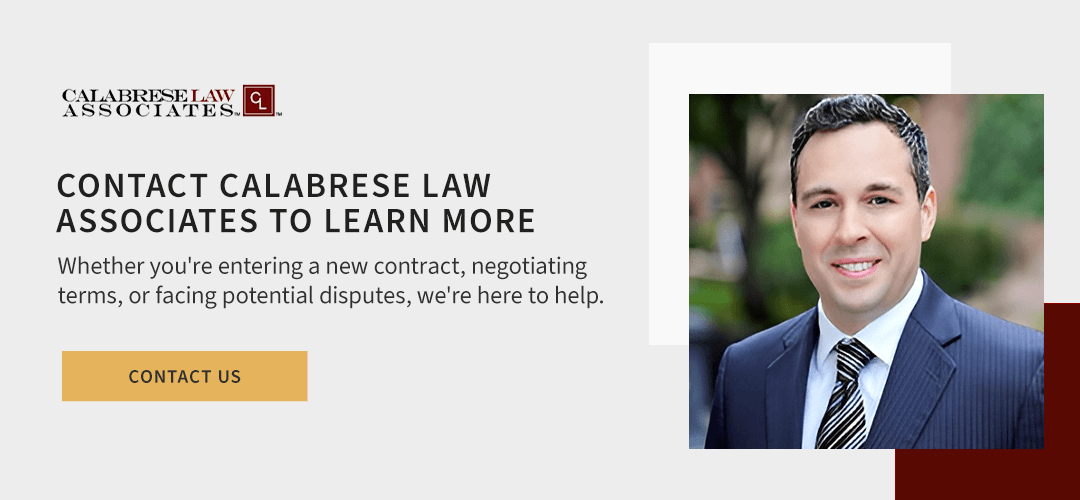There are different types and sizes of agreements, but certain provisions are common in all of them. Examples are representations, warranties, covenants, and conditions. The specifics and legal implications of these provisions vary on a case-by-case basis. However, it is crucial to understand their general roles and how they can affect your transactions.
Peter G. Calabrese, the Managing Attorney of Calabrese Law Associates, contributed a chapter addressing representations, warranties, covenants, and conditions in contractual agreements for Massachusetts Continuing Legal Education (MCLE). Learn more about these provisions, or contact us now for professional assistance.
What Are Representations?
A representation is a presentation of facts made to induce someone to do an act, like entering into a contract. A representation could be either by words or conduct. It could also be express or implied. An express representation is created by overt actions or words — explicitly stated or communicated to the other party. An implied representation is inferred from the circumstances, the parties’ conduct, or the nature of the contract itself.
Representations generally apply to past or present factual statements. However, continuing representations may create a duty to inform the other party of changes in the accuracy of previously communicated facts.
What Are Warranties?
A warranty is an express or implied promise or guarantee made by one party to another. It assures the recipient that a fact is true and accurate. If the fact is or becomes untrue, the recipient is protected by an implied promise of indemnity, in which case the warrantor must correct the fact or cover losses incurred by the innocent party. Warranties apply to past, present, or future factual situations.
In Massachusetts, warranties regarding the sale of goods are governed by Article 2 of the Massachusetts Uniform Commercial Code (UCC). Article 2A of the same statute governs warranties regarding leased goods.
Express Warranties
Express warranties are explicit promises or guarantees the seller makes, assuring the buyer that the goods or services will have certain qualities. They can be created when any of the following becomes part of the basis of the bargain:
- An affirmation of fact or promise made by the seller regarding the goods
- A description of the goods
- A sample or model
The seller can create a warranty without using the words “warranty” or “guarantee,” whether or not they intend to. However, merely affirming the value of the goods or providing opinions or recommendations may not qualify as a warranty.
When the seller makes a warranty to cure a breach arising from a defective product, they may provide exclusive remedies to limit the buyer’s recourse to those described in the contract. For example, if your vacuum breaks while under warranty, the seller may dictate that they will repair or replace it at their discretion but won’t refund your money.
Express warranties for services operate similarly to those for goods.
Implied Warranties
The UCC provides certain implied warranties, including those related to the following:
- Title
- Trade usage
- Infringement
- Course of dealings
- Merchantability of goods
- Fitness of goods for a particular purpose
Some implied warranties may be created by operation of law — the automatic effect that certain legal principles or statutes create rights, obligations, or relationships without the need for any action or agreement by the parties involved. An example is the implied warranty related to the merchantability of goods.
Other warranties may be created under specific circumstances. For instance, to succeed in a claim under an implied warranty of fitness for a particular purpose, the following must be established:
- The seller knew the buyer’s purpose
- The buyer relied on the seller’s skill or judgment
Parties can modify or exclude implied warranties through contracts, by course of dealing between the parties, or as generally used in the particular trade.
In addition to the warranties for products and services, others relate to:
- Construction projects
- Consumer transactions
- Commercial arrangements and transactions
How Representations and Warranties Work Together
Representations and warranties combine to provide significant advantages, such as:
- Risk allocations: By making representations, a party takes on the risk that the statements are true. Warranties can provide a safety net by offering remedies if the goods or services do not meet the promised standards.
- Due diligence: Due diligence processes often focus on verifying representations made by the seller. If the facts turn out to be false, warranties can help the buyer recover losses incurred.
- Facilitates agreements and negotiations: Representations and warranties can facilitate transactions by providing assurances to help parties feel confident. Sellers can use them to induce buyers, and buyers can rely on them to obtain information that might impact negotiations.
- Closing transactions: In transactions such as loans or mergers and acquisitions, parties use representations and warranties as conditions to close, especially if they will execute the agreement at a later date.
Some contracts exclude representations and misrepresentations altogether. They have clauses stating that the contract is the entire agreement between the parties. These provisions are common but create challenges when oral representations are made before the contract is reduced to writing.
What Are Covenants?
A covenant is a formal promise or agreement to do or refrain from doing an act. It can be affirmative or negative. Affirmative covenants mandate a party to do a specified act, whereas negative covenants require the party to refrain from doing an act. Like representations and warranties, covenants can be express or implied.
Sometimes, covenants run between the transaction’s signing and closing. These are often called preclosing covenants. Post-closing covenants, in contrast, cover periods after the closing.
What Are Conditions?
A condition is a future event that triggers or negates an obligation or liability. It can take the form of a condition precedent or subsequent in a contract. A condition precedent is an effect that must occur for the agreement to be binding or for certain obligations to become enforceable. Conversely, a condition subsequent terminates or modifies a party’s obligation.
Conditions precedent can be in transactional agreements, such as:
- Leases
- Loan or credit agreements
- Purchase and sale agreements
Other agreements may also contain conditions precedent, such as:
- Employment offers
- Software license agreements
Parties can conclude transactional agreements at the signing and closing stages. Where the signing and closing occur at a later date, the contract may stipulate the conditions for closing.
Like conditions precedent, conditions subsequent also play a crucial role in contracts. A classic example is a force majeure clause, which relieves parties of their contractual obligations if an unforeseen event makes the performance impractical or impossible.
How Representations, Warranties, Covenants, and Conditions Work Together
When drafting or negotiating representations, warranties, covenants, and conditions, you must know when and how to broaden or narrow their scope. Using qualifiers helps you allocate risks and verify the accuracy of information during due diligence. For example, suppose you stipulate a time when certain facts existed, such as during the execution or closing of the contract. Beyond that period, the risks shift to the party required to verify those representations.
In covenants, a party may draft provisions narrowly based on the other’s ability to perform. Alternatively, if the covenant is broadly carved, parties can explicitly exclude or limit certain occurrences, introduce contingencies, or provide grace periods to cure noncompliance.
Besides allocating risks, representations and warranties allow buyers to verify information during due diligence and uncover latent issues. Sellers can leverage this opportunity to clarify matters or disclose facts to limit potential liability. Moreover, those who make representations and warranties often prefer them to be drafted as narrowly as possible, while the recipients prefer broadly drafted representations and warranties.
Sellers can use several techniques to narrow representations, warranties, covenants, and conditions, such as qualifying the following:
- The type of knowledge
- The type of communication
- Materiality
- Efforts
- Exception
- Survival limitations
Remedies for Misrepresentation, Breach of Warranty, and Violation of Covenants
There are two primary remedies — judicial and contractual:
1. Judicial Remedies
Judicial remedies have five categories:
- Contract claims: These claims may arise from a breach of an express warranty or a covenant. The injured party may recover general damages, which would put them in the same position they would have been in but for the breach.
- Tort claims: These claims arise as fraudulent or negligent misrepresentation under common law tort. Misrepresentation is a false statement of fact that induces a party to contract, thereby causing a loss. The damages depend on whether the statement or conduct was intentional or unintentional.
- Claims under Chapter 93A: In consumer and business transactions, fraudulent misrepresentation can result in claims under unfair practices. Intentional or deliberate breaches of warranty can also qualify as wilful conduct under the law, attracting significant damages.
- Claims under securities laws: For transactions involving the sale of stock or securities, misrepresentation can create a cause of action under federal or state laws, like Rule 10b-5 of the Securities Act of 1933. A cause of action is the combination of facts that entitles a person to claim legal remedies.
- Equitable relief: Breaches of representations or warranties may permit remedies such as compensation or canceling the contract. Breaches of covenants may also support additional reliefs like court orders to perform or cease performing certain actions. Lastly, the injured party may claim under equitable estoppel.
2. Contractual Remedies
Parties may arrange contractual or negotiated remedies independent of those provided by law. These include:
- Termination: In the event of a breach of representation, warranty, covenant, or condition, the injured party may terminate the contract.
- Limitation of remedies: Express warranties may limit the remedies for breaches, such as repairing or replacing defective products or providing a refund at the seller’s option.
- Liquidated damages: Where determining compensatory damages presents a challenge, parties can include liquidated damages. Liquidated damages are the specified amount or formula for calculating an amount in case of a breach.
Other contractual or negotiated remedies include extending the performance due date and the right to indemnification— the list goes on.
Common Mistakes and Pitfalls
Below are some of the common mistakes parties make regarding representations, warranties, covenants, and conditions:
- Ignoring the parole evidence rule: The doctrine generally prevents parties from introducing foreign terms — evidence existing outside the contract terms — to contradict those included in the written agreement. Thus, if an oral representation, warranty, covenant, or condition is excluded, parties may not enforce them.
- Taking an atomistic approach: Failing to take a holistic approach or modify overlapping representations or warranties can prevent a party from receiving benefits. Instead, include covenants and conditions, and negotiate representations and warranties.
Other pitfalls include:
- Using templates without tailoring them.
- Failing to require clients to review representations and warranties before signing.
- Failing to consult clients on concerns or potential issues arising from the due diligence.
- Ignoring overlaps between certain representations and warranties and catch-all clauses.
The Role of Attorneys
Lawyers play a crucial role in negotiating, drafting, and enforcing representations, warranties, covenants, and conditions in contracts. Here is an overview:
- Drafting and negotiation: Lawyers draft these provisions, considering the parties’ interests and needs. They can also negotiate terms to achieve favorable outcomes for clients.
- Legal compliance: Lawyers can examine these provisions to ensure consistency with other contracts and applicable regulations. This strategy can reduce the risk of legal disputes or unenforceable provisions.
- Legal advisory: Attorneys can explain the legal implications of these provisions. They can also assess the potential legal remedies, damages, and impact on the contractual relationship.
- Due diligence: Attorneys can conduct due diligence to verify the accuracy of representations and implement strategies to minimize risks, such as including warranties.
- Dispute resolution: Attorneys can help clients enforce their rights. They can leverage alternative dispute resolution (ADR) mechanisms like mediation or arbitration to resolve conflicts or pursue litigation if necessary.
- Ongoing legal support: After a contract is executed, lawyers may assist clients in monitoring compliance. They can also advise them on their responsibilities or the potential consequences of breaches and assist with modifications or amendments.
Why Trust Us?
At Calabrese Law Associates, trust is at the core of everything we do. Our firm, led by seasoned attorney Peter Calabrese, is committed to excellence and integrity and prioritizes client satisfaction. With years of experience representing clients in various legal matters, including contract negotiations, business transactions, and dispute resolution, we have earned a reputation for delivering results and personalized service.
Our approach is built on transparency, clear communication, and a deep understanding of our clients’ needs. We build lasting relationships based on trust and reliability, ensuring our clients feel confident in our legal representation. When you choose Calabrese Law Associates, you can count on your legal matters being in capable hands. Let us guide you through your legal challenges with professionalism and dedication.
Read our client testimonials and reviews to learn more about the firm.
Contact Calabrese Law Associates to Learn More
Understanding representations, warranties, covenants, and conditions is crucial for protecting your interests in any contract. At Calabrese Law Associates, we specialize in navigating these complex legal concepts to ensure your agreements are solid and enforceable. Our experienced team is dedicated to providing legal solutions tailored to your needs.
Whether you’re entering a new contract, negotiating terms, or facing potential disputes, we’re here to help. Don’t leave your legal matters to chance—contact us today to learn how we can support you in safeguarding your rights and interests!
This publication and its contents are not to be construed as legal advice nor a recommendation to you as to how to proceed. Please consult with a local licensed attorney directly before taking any action that could have legal consequences. This publication and its content do not create an attorney-client relationship and are being provided for general informational purposes only.
Attorney Advertising. Prior results do not guarantee a similar outcome.







